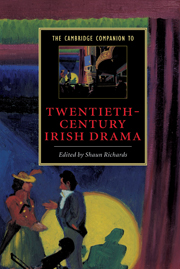Book contents
- Frontmatter
- 1 Plays of (ever) changing Ireland
- 2 Late nineteenth-century Irish theatre: before the Abbey – and beyond
- 3 The ideology of the Abbey Theatre
- 4 The theatre of William Butler Yeats
- 5 Lady Gregory’s Abbey Theatre drama: Ireland real and ideal
- 6 J. M. Synge, ‘national’ drama and the post-Protestant imagination
- 7 On the siting of doors and windows: aesthetics, ideology and Irish stage design
- 8 Oscar Wilde and the politics of style
- 9 George Bernard Shaw and Ireland
- 10 Sean O’Casey’s Dublin Trilogy: disillusionment to delusion
- 11 Ireland’s ‘exiled’ women playwrights: Teresa Deevy and Marina Carr
- 12 Samuel Beckett and the countertradition
- 13 Brian Friel’s sense of place
- 14 The Field Day Theatre Company
- 15 Tom Murphy and the children of loss
- 16 Reconstructing history in the Irish history play
- 17 The Abbey Theatre and the Irish state
- 18 Staging contemporary Ireland
- 19 The Revival revised
- Guide to further reading
- Index
- Series List
18 - Staging contemporary Ireland
Published online by Cambridge University Press: 28 May 2006
- Frontmatter
- 1 Plays of (ever) changing Ireland
- 2 Late nineteenth-century Irish theatre: before the Abbey – and beyond
- 3 The ideology of the Abbey Theatre
- 4 The theatre of William Butler Yeats
- 5 Lady Gregory’s Abbey Theatre drama: Ireland real and ideal
- 6 J. M. Synge, ‘national’ drama and the post-Protestant imagination
- 7 On the siting of doors and windows: aesthetics, ideology and Irish stage design
- 8 Oscar Wilde and the politics of style
- 9 George Bernard Shaw and Ireland
- 10 Sean O’Casey’s Dublin Trilogy: disillusionment to delusion
- 11 Ireland’s ‘exiled’ women playwrights: Teresa Deevy and Marina Carr
- 12 Samuel Beckett and the countertradition
- 13 Brian Friel’s sense of place
- 14 The Field Day Theatre Company
- 15 Tom Murphy and the children of loss
- 16 Reconstructing history in the Irish history play
- 17 The Abbey Theatre and the Irish state
- 18 Staging contemporary Ireland
- 19 The Revival revised
- Guide to further reading
- Index
- Series List
Summary
‘[T]he Free State didn’t change anything more than the badges on the warders’ caps.’
(Brendan Behan, The Quare Fellow)‘Hope deferred maketh the something sick. Who said that?’
(Samuel Beckett, Waiting for Godot)The film Mise Éire (1959) was produced at a time of profound cultural change in the Republic of Ireland. Eamon de Valera was about to relinquish executive office to his successor as leader of Fianna Fáil, Sean Lemass. Lemass, with T. K. Whitaker, was embarked on the First Programme for Economic Expansion, the economic logic of Fianna Fáil's abandonment of republican nationalism. In place of an All-Ireland national unity – that grail of the Lemass/de Valera generation – would come a new compact with capitalism itself. The nation would be fulfilled not in the achievement of a complete independence, but in an alignment with global capital. Needless to say, this pragmatism was not publicly promulgated in so many words. It had, however, long been available to consciousness at the lived level of individual, family and class experience.
Mise Éire’s triumphalist account of Irish nationalist progression amounted to an almost unchallengeable hegemonic narrative until Northern Ireland exploded in ‘The Troubles’ of 1969. The film contains one sequence which is of particular interest to a discussion of contemporary Irish theatre. A hoist camera pans across a city street crammed with heaving humanity assembled to greet the 1916 revolutionary Constance Markievicz, on her return in 1918 from incarceration in a British jail.
- Type
- Chapter
- Information
- The Cambridge Companion to Twentieth-Century Irish Drama , pp. 244 - 257Publisher: Cambridge University PressPrint publication year: 2004
- 5
- Cited by



